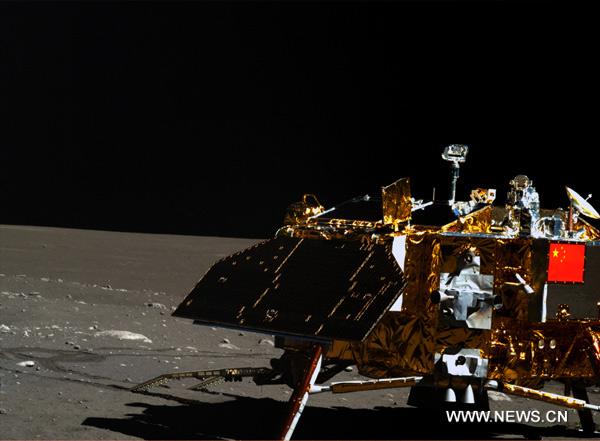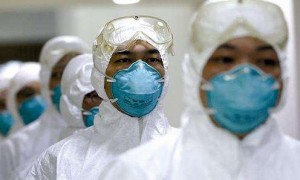“玉兔”号第四月昼成功唤醒 故障仍然存在
BEIJING, March 14 (Xinhua) -- China's moon rover Yutu woke up again at 6:42 a.m. on Friday, after its third dormancy, but even after a long rest, mechanical problems have not been resolved.
 |
| This undated photo taken by the camera on the Yutu moon rover shows the Chang'e-3 moon lander and the moon surface. The Chang'e-3 lander entered its third dormancy on early Feb. 23, 2014. China's lunar rover Yutu also entered the dormancy on Feb. 22, with the mechanical control issues that might cripple the vehicle still unresolved. According to the State Administration of Science, Technology and Industry for National Defence (SASTIND), Yutu only carried out fixed point observations during its third lunar day, equivalent to about two weeks on Earth. Yutu's radar, panorama camera and infrared imaging equipment are functioning normally, the control issues that have troubled the rover since January persist. (Xinhua/SASTIND) |
Yutu and the lander, which woke up earlier on Wednesday, have restarted their operations and are exploring as scheduled, according to the State Administration of Science, Technology and Industry for National Defence (SASTIND).
The control issues that have troubled Yutu since January remain, but its panorama camera, radar and other equipment are functioning normally, SASTIND said.
The cause of the problems is a mystery. The lander functioned normally during its first three lunar days, according to the SASTIND. A lunar day is equivalent to about two weeks on Earth.
The lander's optical telescope, extreme ultraviolet camera and lunar dust measurement device completed scheduled tasks and obtained a large amount of data.
Yutu, named after the pet rabbit of the lunar goddess Chang'e in Chinese mythology, touched down on the moon's surface on Dec. 15, some hours after lunar probe Chang'e-3 landed.
It has now survived its design life of three months.
The rover was intended to roam the lunar surface, surveying the geological structure and substrate while looking for natural resources, but problems emerged before the second dormancy on Jan. 25 as the lunar night fell. According to SASTIND, the problem was caused by the "complicated lunar surface."
Chang'e-3 is part of the second phase of China's lunar program, which includes orbiting, landing and returning to Earth. It follows the success of the Chang'e-1 and Chang'e-2 missions in 2007 and 2010.
China is the third country to soft-land on the moon after the United States and the Soviet union .







